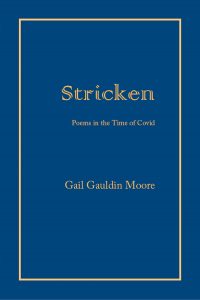Stricken: Poems in the Time of Covid
by Gail Gauldin Moore
ISBN: 978-1-7368477-5-6
6 x 9 in.; 102 pages; $19.00
available now
Stricken is captivating
Gail Gauldin Moore’s ‘Stricken’ is truly captivating. It’s also perfectly timed for a society shaken by all manner of plagues. “Eternity,” she writes, “is a spasm in a Petri dish.” Everywhere throughout this collection, Moore’s poetry is at once prescient and inquisitive, deftly embodying the beguilement of the day. At it’s heart, however, it is a study of personal loss, a tribute to love’s inevitable wound. “For me, the best thing now / is coping with the worst thing.” There is potent medicine here. Moore is at the height of her art.
—Brendan Constantine, author of ‘Dementia, My Darling’
Gail Gauldin Moore’s new collection of poems, Stricken , takes us to the deepest places grief can touch inside our lives. The death of her son, Michael, opened a chasm of sadness and loneliness that one hesitates to look into, but look into that chasm Ms. Moore does and we look into it with her, one heartfelt poem at a time.
Gail Gauldin Moore pulls us into the embrace of poignancy, and the confusion of disbelief in the demon Mortality. In the poem, For Michael: 1926-2020 , she says: “The unbearable cannot be borne./The deepest logic is a scream./I stand here beside myself, screaming.”
Moore’s poignancy, her search for comfort during a comfortless time, bids us look into our own fears of death, our own caves of loneliness.
In the title poem, Stricken , Moore delivers to us a feeling we know and now have permission to own: “What was this death they say you had/ My son! My son!/Call for the messenger./Call for the day when you first came.”
Stricken holds us up to ourselves. You’ll think about this book, feel it’s pain, recall the griefs and grievances of our own lives. You’ll go back to this book many times—physically and in your dreams—for a very long while.
—Martina Reisz Newberry, author of Blues for French Roast With Chicory
Stricken is literally breathtaking. Gail Gauldin Moore simultaneously shocks and caresses us. As always with this poet, her sensibility is highly refined but never “precious”–raw, even searing, while still intelligible and keenly thoughtful. Whether addressing the state of our culture during the pandemic or the loss of a grown son, these poems move with the obsessiveness, sorrow, quirkiness and unbounded passion for life that we get from the Argentine Tango. From the title poem: “Someone said you were dancing./ I wanted to be in the dance./ I wanted to bivouac with toy soldiers./ Or sleep forever—just to dream/ that life would come back.”
If I could have only five poetry books, this would be one.
—Marjorie Power, author of Sufficient Emptiness
